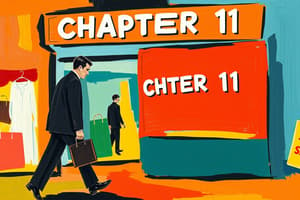Podcast
Questions and Answers
Which of the following are types of Chapter 11 bankruptcy?
Which of the following are types of Chapter 11 bankruptcy?
- Freefall (correct)
- Term Sheet ('Bear Hug') (correct)
- Prepackaged (correct)
- Chapter 7
What is the Debtor in Possession (DIP)?
What is the Debtor in Possession (DIP)?
The president of the business with the exclusive right to propose a repayment plan.
How does the DIP's responsibility shift when Chapter 11 starts?
How does the DIP's responsibility shift when Chapter 11 starts?
From being accountable to officers and shareholders to being accountable to creditors.
The DIP is authorized to run the business.
The DIP is authorized to run the business.
The DIP can enter into contracts outside the regular course of business.
The DIP can enter into contracts outside the regular course of business.
The DIP is authorized to use, sell, and lease property.
The DIP is authorized to use, sell, and lease property.
For what reasons could the DIP be removed?
For what reasons could the DIP be removed?
What are some first day motions the DIP will want to make?
What are some first day motions the DIP will want to make?
What should be remembered about first day motions?
What should be remembered about first day motions?
What is a Chief Restructuring Officer?
What is a Chief Restructuring Officer?
What is the role of the United States Trustee in Chapter 11?
What is the role of the United States Trustee in Chapter 11?
What is the Unsecured Creditor's Committee?
What is the Unsecured Creditor's Committee?
What about Secured Creditors?
What about Secured Creditors?
Utility companies can't turn off utilities within the first ______ days after filing bankruptcy.
Utility companies can't turn off utilities within the first ______ days after filing bankruptcy.
What constitutes adequate assurance?
What constitutes adequate assurance?
What security interest does a creditor want?
What security interest does a creditor want?
The DIP is entitled to sell what types of collateral?
The DIP is entitled to sell what types of collateral?
A good budget will give the creditor adequate ______ in the debtor's cash.
A good budget will give the creditor adequate ______ in the debtor's cash.
Study Notes
Chapter 11 Bankruptcy Types
- Three types of Chapter 11 filings: Freefall (no plan), Prepackaged (creditors agree pre-filing), Term Sheet ("Bear Hug") (agreement with lead creditors).
Debtor in Possession (DIP)
- DIP acts as president of the business, proposing repayment plans for creditors within 120 days.
- Functions as a trustee under Chapter 11, with responsibilities akin to those in Chapters 13 and 7.
DIP's Responsibility Shift
- Pre-Petition: Answers to officers and shareholders.
- Post-Petition: Accountable primarily to creditors, focusing on reviving the company for debt repayment.
DIP's Authority
- Authorized to operate the business in the ordinary course, as per § 1108.
- Must seek court approval for actions outside everyday business operations.
Contracts and Transactions
- Cannot enter contracts outside ordinary business; such transactions may be reversed under § 549.
- Can utilize, sell, and lease property as per § 362d.
Grounds for Removal of DIP
- May be removed for cause, including fraud, dishonesty, incompetence, or gross mismanagement (mismanagement alone is insufficient for removal).
First Day Motions
- Key motions include employee compensation, public relations, upfront lawyer fees, conflict of interest checks, and plan approvals.
Importance of First Day Motions
- Must maintain context of bankruptcy, focusing on stabilization and addressing immediate issues to prevent irreparable harm.
Chief Restructuring Officer (CRO)
- A CRO may be hired for their expertise in making the company profitable during restructuring.
Role of the United States Trustee
- Oversees the DIP, particularly active with smaller companies to ensure compliance.
Unsecured Creditor's Committee
- Comprised of the seven largest unsecured creditors who represent the interests of all unsecured creditors, chaired by the creditor with the highest claims.
Secured Creditors
- Do not have a formal committee; each acts independently, secured by their collateral. § 506 (a) governs their rights.
Utility Services & Assurance
- Utilities cannot be discontinued within 20 days of filing; after this, utilities can be cut off unless the debtor provides adequate payment assurance.
Adequate Assurance of Payment
- May include cash deposits, letters of credit, certificates of deposit, surety bonds, prepaid utility consumption, or mutually agreed security forms.
Creditor's Security Interest
- Creditors seek security in inventory, accounts receivable, and cash collateral from inventory sales, as defined by § 363.
DIP's Sale Entitlements
- Can sell hard collateral in the ordinary course of business.
- Cash collateral requires court or lender approval for sale.
Importance of a Good Budget
- Ensures creditors have sufficient interest in the debtor's cash flow, facilitating approval from lenders.
Studying That Suits You
Use AI to generate personalized quizzes and flashcards to suit your learning preferences.
Description
Test your knowledge on Chapter 11 bankruptcy concepts with these flashcards. Explore the types of Chapter 11 filings and the role of the Debtor in Possession. Perfect for law students and professionals looking to reinforce their understanding of bankruptcy procedures.



